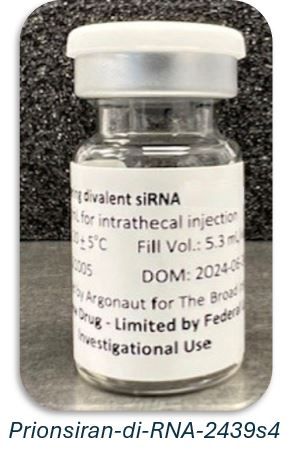siRNA: From Bench to Clinic
siRNAs are a new class of drugs with the potential to transform the way medicine is practiced. To date, seven siRNA-based therapeutics have received regulatory approval, all targeting gene expression in the liver.
Technologies developed in our lab, specifically the ability to deliver to tissues outside the liver, have laid the foundation for the development of novel RNA-based therapeutics across a wide range of clinical indications. We collaborate with both academic and industry partners to accelerate the clinical translation of these compounds.
Three of our drug candidates have now received regulatory approval to formally initiate clinical testing, with many more in various stages of preclinical development.
 2439-s4 – A divalent siRNA targeting the PRNP gene (di-RNA-2439s4) for the treatment of prion disease. Prion diseases are rare, fatal neurodegenerative disorders caused by misfolded prion proteins, with no effective treatments currently available. Prionsiran is designed to potently and selectively silence PRNP expression in the brain, aiming to halt disease progression at its molecular root. Developed by the Sonia Vallabh and Eric Minikel Lab at the Broad Institute, the program exemplifies patient-driven innovation. In an unprecedented move, the Vallabh/Minikel Lab made an open IND publicly available to accelerate the clinical translation of RNA therapeutics for diseases with limited commercial potential.
2439-s4 – A divalent siRNA targeting the PRNP gene (di-RNA-2439s4) for the treatment of prion disease. Prion diseases are rare, fatal neurodegenerative disorders caused by misfolded prion proteins, with no effective treatments currently available. Prionsiran is designed to potently and selectively silence PRNP expression in the brain, aiming to halt disease progression at its molecular root. Developed by the Sonia Vallabh and Eric Minikel Lab at the Broad Institute, the program exemplifies patient-driven innovation. In an unprecedented move, the Vallabh/Minikel Lab made an open IND publicly available to accelerate the clinical translation of RNA therapeutics for diseases with limited commercial potential.
CBP-4888 – A lipophilic siRNA that selectively targets sFLT1 for the treatment of preeclampsia. Preeclampsia is a serious pregnancy complication characterized by high blood pressure and organ dysfunction, often linked to elevated levels of sFLT1, which disrupts placental blood flow. CBP-4888 uses a fully non-viral, extrahepatic delivery platform to selectively knock down sFLT1, offering a novel, targeted approach to treating preeclampsia at its molecular origin.
ALYS-101 – A lipophilic siRNA targeting JAK1, a key regulator of inflammation, for the localized treatment of alopecia areata. Alopecia areata is an autoimmune disorder that causes patchy or total hair loss, driven by inflammatory signaling pathways, particularly those involving JAK1. ALYS-101 is a topically administered siRNA designed for local silencing of JAK1, enabling targeted immunomodulation without systemic side effects.

